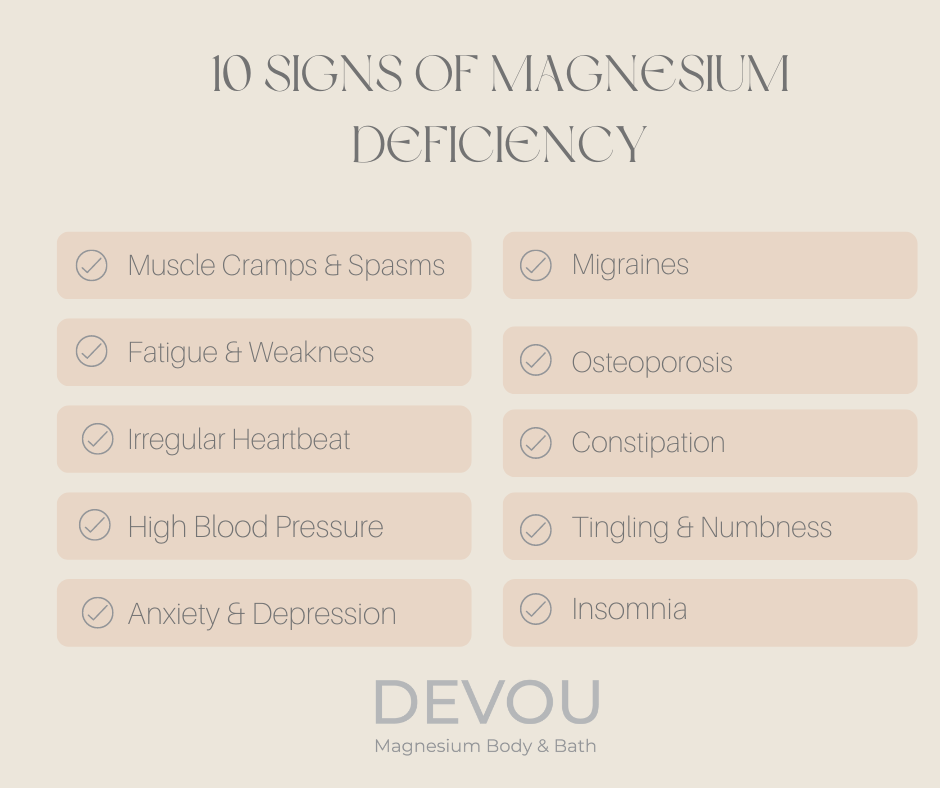Magnesium is an essential mineral that is responsible for many physiological processes in the body, including energy production, nerve function, and muscle contraction. It is required for over 300 enzymatic reactions in the body and is essential for the proper functioning of many systems, including the cardiovascular, nervous, and immune systems.
Despite its importance, magnesium deficiency is quite common. According to a study, approximately 48% of Americans consume less than the required amount of magnesium. Magnesium deficiency can lead to a variety of symptoms and health problems. In this blog post, we will discuss some of the signs of magnesium deficiency.
- Muscle cramps and spasms
One of the most common signs of magnesium deficiency is muscle cramps and spasms. Magnesium is required for proper muscle function, and a deficiency can cause muscle twitching, cramps, and spasms. This can occur anywhere in the body, but it is most commonly seen in the legs.
- Fatigue and weakness
Magnesium is also required for energy production, and a deficiency can cause fatigue and weakness. Without enough magnesium, the body cannot produce the energy needed to carry out daily activities. This can result in feelings of exhaustion, weakness, and lethargy.
- Insomnia and other sleep problems
Magnesium plays a crucial role in the regulation of sleep, and a deficiency can lead to insomnia and other sleep problems. Magnesium is required for the production of the sleep hormone melatonin, and a deficiency can disrupt the normal sleep cycle. This can result in difficulty falling asleep, staying asleep, or feeling unrested upon waking.
- Anxiety and depression
Magnesium is also important for mental health. A deficiency can lead to anxiety and depression. Magnesium plays a role in the production of neurotransmitters that regulate mood, and a deficiency can disrupt this process. This can lead to feelings of anxiety, depression, and other mood disorders.
- High blood pressure
Magnesium is required for the proper functioning of the cardiovascular system, and a deficiency can lead to high blood pressure. Magnesium helps to relax the blood vessels, which allows blood to flow more easily. Without enough magnesium, the blood vessels can become constricted, leading to high blood pressure.
- Irregular heartbeat
Magnesium is also required for the proper functioning of the heart, and a deficiency can cause an irregular heartbeat. Magnesium helps to regulate the heart rhythm, and a deficiency can disrupt this process. This can result in palpitations, arrhythmias, and other heart-related problems.
- Osteoporosis
Magnesium is required for the formation and maintenance of healthy bones, and a deficiency can lead to osteoporosis. Magnesium helps to regulate the balance of calcium in the body, which is important for bone health. Without enough magnesium, the bones can become weak and brittle, leading to an increased risk of fractures.
- Migraines and headaches
Magnesium is also important for the regulation of blood vessels, and a deficiency can lead to migraines and headaches. Magnesium helps to relax the blood vessels, which can reduce the severity and frequency of headaches.
- Constipation
Magnesium is required for the proper functioning of the digestive system, and a deficiency can cause constipation. Magnesium helps to relax the muscles in the digestive tract, which allows food to move through the system more easily. Without enough magnesium, the muscles can become tense, leading to constipation.
- Tingling and numbness
Magnesium is important for nerve function, and a deficiency can lead to tingling and numbness. Magnesium helps to regulate the electrical impulses in the nervous system, and a deficiency can disrupt this process. This can result in tingling and numbness, especially in the hands and feet.
HOW TO ADDRESS A DEFICIENCY
Magnesium deficiency can be addressed through several methods, depending on the severity of the deficiency and the underlying cause. Here are some ways to address magnesium deficiency:
- Increase dietary intake: One of the easiest ways to increase magnesium levels is to consume more magnesium-rich foods such as leafy green vegetables, nuts, seeds, whole grains, and legumes.
- Consider magnesium supplements: If you are unable to get enough magnesium from your diet alone, you may need to take a magnesium supplement. Talk to your doctor or a registered dietitian to determine the appropriate dose and type of magnesium supplement for you.
- Topical magnesium: Magnesium can also be absorbed through the skin, so applying a magnesium oil or lotion to the skin can be an effective way to increase magnesium levels.
- Address underlying health conditions: Certain health conditions such as gastrointestinal disorders, kidney disease, and diabetes can interfere with magnesium absorption or increase magnesium excretion. Treating these underlying conditions can help address magnesium deficiency.
It’s important to note that magnesium supplements can interact with certain medications, so it’s important to talk to your doctor before taking any supplements. Additionally, it’s always best to get nutrients from food sources whenever possible, so focus on incorporating magnesium-rich foods into your diet as a first line of defense against deficiency.
Written by Jenny Charlesworth
Nutritionist




Leave A Comment